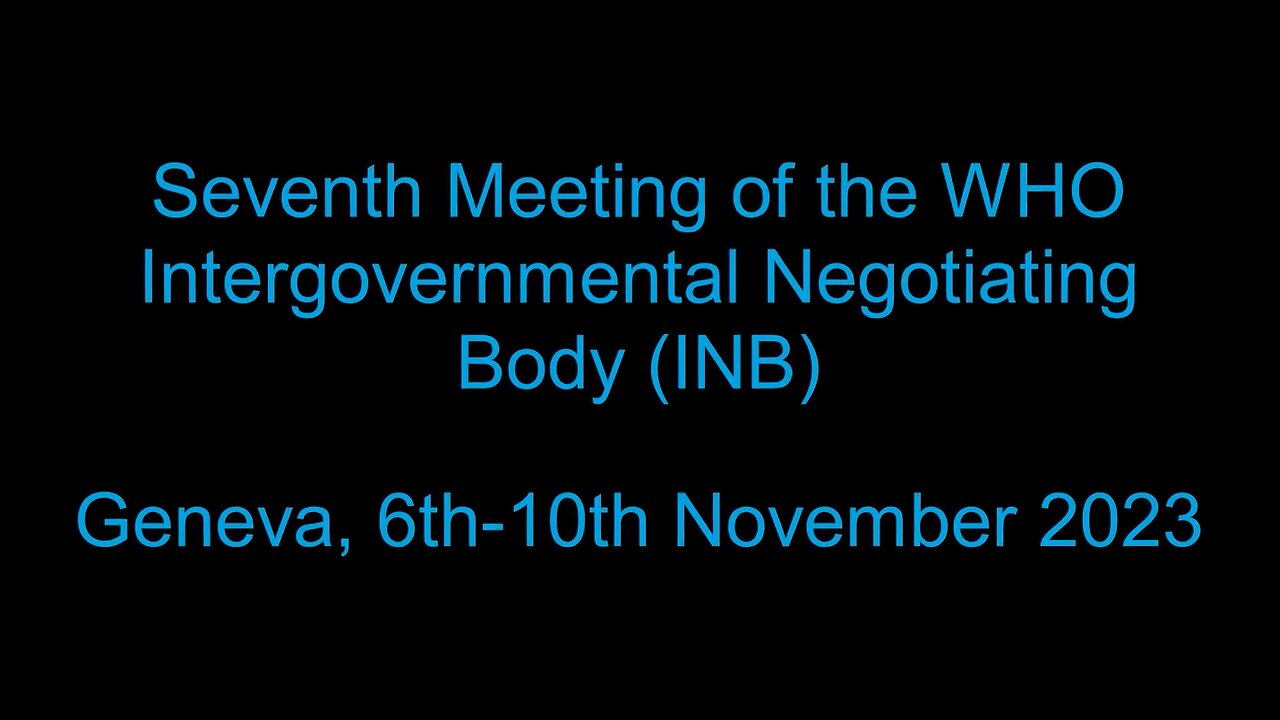Premium Only Content

Seventh Meeting of the WHO Intergovernmental Negotiating Body (INB). Geneva, 6th-10th November 2023.
The Seventh meeting of the Intergovernmental Negotiating Body (INB) took place in Geneva between 6th and 10th November 2023.
Introduction
In the opening session of the INB, which took place on Monday 6th November, the Member States along with relevant stakeholders were invited to consider and comment on the Bureau’s proposal for negotiation text of the WHO Pandemic Agreement. (https://apps.who.int/gb/inb/pdf_files/inb7/A_INB7_3-en.pdf)
The opening session was publicly webcast.
The Bureau claimed they took the inputs of the countries from both formal and inter-sessional informal sessions into account when producing the legally formatted and streamlined proposed negotiating text of the WHO Pandemic Agreement. Ultimately, only the ideas that “they”, the Bureau, believed to be relevant were included.
Over sixty (60) individual Member States (some commenting on behalf of wider groups of Member States) and over forty (40) relevant stakeholders commented on the proposed negotiating text during a meeting that lasted over six (6) hours.
Summary
A greater percent of relevant stakeholders, compared to Member States, raised concerns around human rights with several commenting they have become less robust over time and demanding that Member States re-instate the full definition of the respect for the human rights principle that was included in Article 3 of the Bureau’s text to “reference the obligation of States to respect, protect and fulfil human rights.”
Several relevant stakeholders mentioned that financing cannot wait until December 2026 and that products arising out of publicly funded research and development should be considered “global public goods”. All welcomed their (the stakeholders) inclusion at the plenary session but want greater involvement in the INB process and to be invited to the drafting sessions. Wouldn’t we all!
Conclusion
There is no doubt that in streamlining the text to create the Negotiating Text, the Bureau has watered down the agreement to the detriment of developing countries. Legally binding language is used when addressing topics such as prevention and preparedness whereas aspirational language, in Articles relating to equity, is used.
There remains division between developed and developing countries on process and this was compounded by the fact that the non-English versions of the Negotiating Text were only made available 3 days prior to INB7 whereas the English version was available several weeks prior. The developing countries, understandably, argue this puts them at a disadvantage at the negotiating table.
Consensus is a long way off and time is running short. It is hard to see how agreement can be reached by May 2024, which raises the question of whether this is, in fact, a distraction. Accordingly, it is important to remain focused on all three processes in this arena – the INB process, the WGIHR process and the UN’s Summit of the Future.
-
 12:30
12:30
UKCitizen - For the People, By The People
11 months agoWorld leading scientists speak to UK Members of Parliament - 4th December 2023 - Dr. Pierre Kory
557 -
 3:00:18
3:00:18
Due Dissidence
1 day agoTHE PEOPLE VS NATURE by Kevin Augustine - plus a talkback w/ Jimmy Dore
8.62K4 -
 LIVE
LIVE
Rotella Games
7 hours agoMake the Hood Great Again | Day 3 | GTA San Andreas
699 watching -
 LIVE
LIVE
PudgeTV
7 hours ago🟡 Practical Pudge Ep 48 with "Willie Faulk" | Catching Up With Old Friends
597 watching -
 18:32
18:32
Forrest Galante
20 hours ago5 Extinct Animals That I Believe Could Still Be Alive...
125K30 -
 DVR
DVR
Major League Fishing
3 days agoLIVE! - General Tire Team Series: Summit Cup - Day 1
90.1K2 -
 7:05:23
7:05:23
Hevel Gaming
22 hours ago $67.80 earnedNCAAF Tennessee at Georgia While with Heroes of Might and Magic III & Helldivers 2
211K23 -
 6:34:08
6:34:08
MissesMaam
21 hours agoI'm Addicted | Sons of the Forest 💚✨
159K30 -
 11:22:12
11:22:12
a12cat34dog
23 hours agoALMOST HAVE ALL GUNS DIAMOND :: Call of Duty: Black Ops 6 :: SO MANY ZOMBIES CAMOS {18+}
96K4 -
 3:32:31
3:32:31
United Fight League
1 day agoUFC 309 Watch Party w/ Rampage Jackson, Maycee Barber, Demi Bagby, and Harrison Rogers
232K40